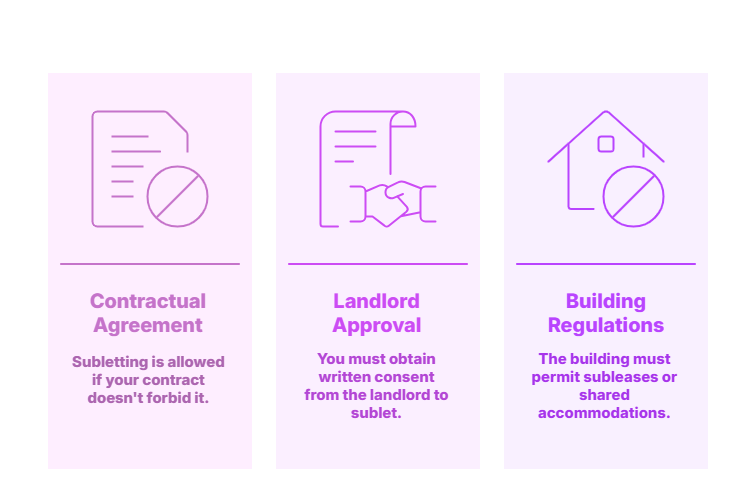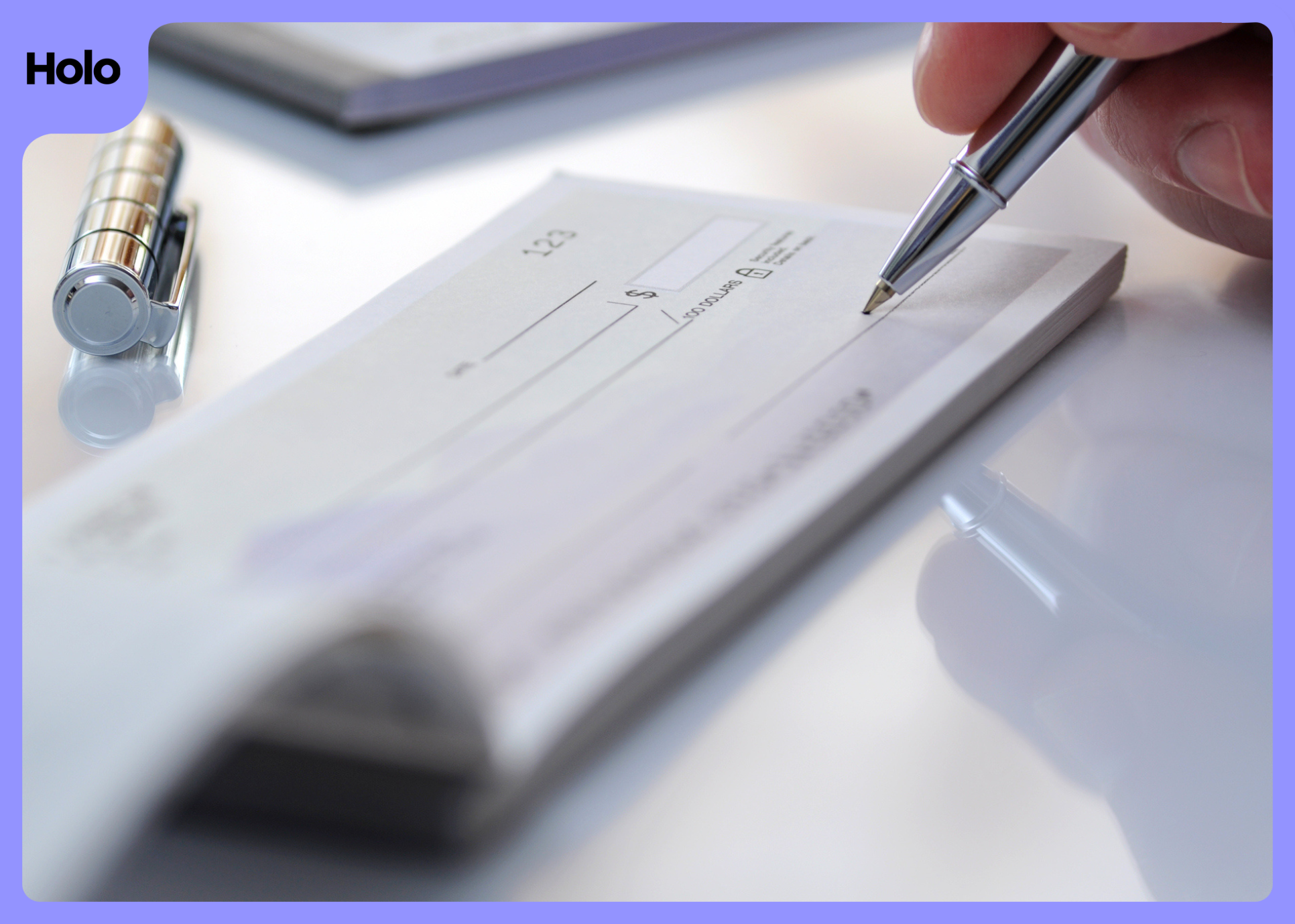
Thinking about buying a home? We've got you covered
Get expert advice today
Dubai's property market is known for its fast-paced, dynamic nature and as more people move in and out of the city for work or lifestyle changes, the need for flexible housing options continues to grow. One solution that's increasingly gaining attention is subletting.
Whether you're a tenant who's temporarily relocating or someone looking for a short-term place to stay without the long-term commitment of a 12-month lease, subletting might be the right fit. But before diving in, there's a lot you need to know - from what's legally allowed to how to do it the right way.
This guide covers everything you need to know about subletting a place in Dubai.
What is Subletting and How Does It Work in Dubai?
Let's start with the basics.
Subletting means that a tenant who is renting a property from a landlord rents out part or all of that property to someone else - called a subtenant - for a period of time. It's a common arrangement in many cities around the world, especially when tenants want to:
- Travel for a few months without giving up their lease
- Share the rent to save money
- Relocate temporarily but keep the lease active
- Monetize extra space they don't need
In Dubai, subletting can happen in different ways:
- Subletting the entire apartment or villa
- Renting out one or more rooms in a shared property
- Offering a short-term stay (though that overlaps with holiday homes)
But here's the catch: you can't just decide to do it. Dubai has clear rules about who can sublet and when.
Is Subletting Legal in Dubai?
Yes, but only under certain conditions.
According to Dubai's rental laws governed by RERA (Real Estate Regulatory Agency), subletting is legal only if the main tenant gets written approval from the landlord.
This is part of Law No. 26 of 2007 and its amendments under Law No. 33 of 2008. If a tenant sublets without the landlord's consent, it's considered a violation and can lead to:
- Fines
- Termination of the lease
- Eviction from the property
- Potential legal disputes
So, before listing your room on Dubizzle or Airbnb, you must check your contract and get permission in writing from your landlord.
When Can You Sublet a Property in Dubai?
Subletting is generally possible if:
- It's not explicitly prohibited in your contract
- You have written approval from the landlord
- The building permits subleases or shared accommodations

Not all types of properties are subletted equally. Here's a comparison:
| Property Type | Can It Be Sublet? | Common Use Cases |
|---|---|---|
| Apartment (full unit) | Yes, with approval | Temporary relocation, overseas travel |
| Apartment (room only) | Yes, with approval | Shared living, saving rent |
| Villa (full or part) | Yes, with approval | Hosting a friend, renting unused annexes |
| Hotel apartments | Rarely allowed | Managed by operators with strict contracts |
Always check your lease and speak with your landlord before offering any part of your home for subletting.
Step-by-Step Guide to Subletting Legally in Dubai
If you're planning to sublet a property you're currently renting, follow these steps:
1. Review Your Lease
Look for any clauses that specifically allow or restrict subletting. Many tenancy contracts in Dubai mention it directly.
2. Get Written Landlord Approval
Request written approval from your landlord. The letter or email should include:
- Full name of the subtenant
- Duration of the sublease
- Any agreed rental amount or terms
3. Notify the Property Management
In residential buildings, property management or homeowners associations often require registration of all occupants. Inform them in advance to avoid issues with access cards, security, or DEWA connections.
4. Create a Sublease Agreement
Draft a formal agreement between you and the subtenant. Include:
- Names and IDs
- Rental amount and due dates
- Duration of stay
- Deposit terms
- Utility responsibilities
- Termination notice terms
5. Consider Ejari Registration (If Required)
Subleases are typically not registered under Ejari, but it may be required for long-term stays or visa purposes. Check with your landlord or a typing center.
6. Screen the Subtenant
As the primary tenant, you are still responsible for any damages or missed rent. Vet the subtenant by checking:
- Valid ID (Emirates ID or passport)
- Proof of income or employment
- References or previous rental history
7. Clarify Utilities and Access
Make sure it's clear who pays for what - DEWA, internet, cleaning, and other services. Also inform the subtenant about any building rules or restrictions.
What Should Be Included in a Sublease Agreement?
Your sublease agreement should be clear, concise, and mutually agreed upon. Here's what to include:
| Section | Details |
|---|---|
| Names & IDs | Full legal names and ID numbers of both parties |
| Property details | Full address and unit number |
| Rent | Monthly rent amount and payment schedule |
| Deposit | Amount, what it covers, and return conditions |
| Duration | Start and end date of the sublease |
| Rules | Guest policy, pet rules, noise restrictions, use of common spaces |
| Utilities | Who pays for DEWA, Wi-Fi, maintenance, etc. |
| Termination clause | Conditions for early termination and required notice period |
| Landlord approval | A statement that the landlord has permitted this sublease |
Keep a copy signed by both parties and, if possible, witnessed by a third person.
Tips for People Looking to Rent a Sublet in Dubai
If you're searching for a sublet instead of offering one, here's what to keep in mind:
Where to Find Sublets:
- Dubizzle - Most active classifieds for shared and full rentals
- Property Finder - Search for short-term and flexible rentals
- Facebook groups - Look for groups like "Dubai Shared Rooms," "Flatmates Dubai," etc.
- Community forums - Platforms like ExpatWoman and Reddit may have leads
What to Watch Out For:
- No signed agreement
- Landlord unaware of the arrangement
- "Cash-only" requests
- Too-good-to-be-true prices
- Refusal to show the place before payment
Questions to Ask:
- Is the landlord informed and okay with the sublet?
- Are utilities included in the rent?
- What's the notice period?
- Can I register this address for visa/Emirates ID (if staying long-term)?
- Is there a deposit? What's the policy to get it back?
Being cautious upfront will save you time, money, and stress later on.
Tips for Main Tenants Who Want to Sublet
If you're currently renting and want to sublet your property or a part of it, consider these best practices:
Screen Your Subtenant
Ask for proof of employment, valid ID, and basic references. Even a quick conversation can give you a feel for who you're renting to.
Take Photos and Notes
Before handing over the keys, take clear photos of the property's condition. This can protect you if there's damage later on.
Keep Proof of Payments
Use bank transfers or written receipts. Keep a record of each rent payment and deposit.
Communicate Clearly
Let the subtenant know about:
- Building rules (e.g., quiet hours, visitors)
- Shared responsibilities
- Emergency contacts or building security
As the original tenant, you're still liable to the landlord. Set expectations early to avoid confusion.
Common Issues With Subletting (And How to Avoid Them)
Subletting is convenient, but it's not without challenges. Here are a few to watch out for:
1. Illegal Subletting
Renting out your space without the landlord's approval is the most common mistake. It can lead to legal trouble, including eviction.
Avoid this by: Always asking for written permission before making any sublet arrangements.
2. Unreliable Subtenants
Late payments, damages, or disputes over bills can cause problems.
Avoid this by: Using a formal agreement, screening your subtenant, and keeping communication open.
3. Building Restrictions
Some buildings do not allow shared accommodations or short-term stays.
Avoid this by: Confirming building rules with the management or security office in advance.
Alternatives to Subletting in Dubai
If subletting isn't suitable for your situation, consider these options:
| Option | Description |
|---|---|
| Short-term rentals | Fully furnished units available for weekly or monthly rental; more flexible |
| Licensed holiday homes | Regulated properties available through platforms like Airbnb or Booking |
| Co-living spaces | Shared accommodations with private rooms and shared amenities |
| Breaking your lease early | If subletting isn't an option, negotiate with your landlord to end the contract early |
Each of these comes with pros and cons depending on your situation, duration of stay, and budget.
Is Subletting in Dubai Worth It?
When done properly, subletting in Dubai can be a win-win. It gives tenants flexibility and subtenants a short-term place to live without committing to a long lease.
But doing it the right way is key:
- Always get written approval from your landlord
- Use a clear sublease agreement
- Make sure everyone involved understands the rules
The risks of cutting corners are high - from eviction to losing your deposit - so follow the proper steps to stay safe and legal.
Want to Buy Your Own Property Instead?
If you're tired of renting or subletting and ready to invest in a place of your own, that's where we can help.
At Holo, we make buying a home simple. We:
- Help you find the right property with personalised assistance.
- Our mortgage brokers in UAE will match you with the right term.
- Guide you through the purchase process from start to finish
While we don't assist with subletting, we do help you make the leap from tenant to owner - with no extra fees and full support.
Related articles

Security Cheque in the UAE: Meaning, Uses, Risks And Your Options.

Best AI Tools for Real Estate Agents in Dubai: The 2025 Playbook to Close More Deals


